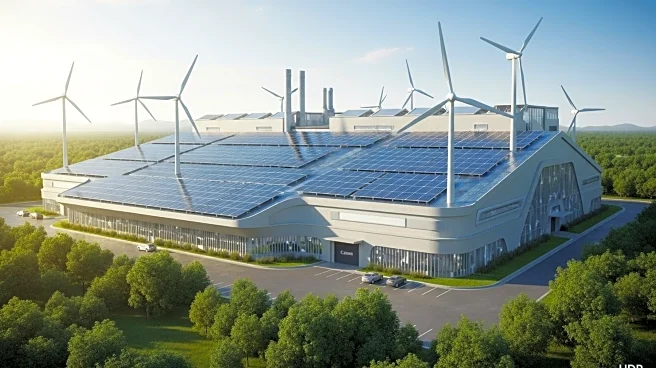What's Happening?
The manufacturing sector is increasingly adopting net-zero emissions goals, driven by innovative funding and incentives. This shift is transforming operations to become more sustainable, as manufacturers leverage financial tools to reduce their carbon footprints. Government grants, private investments, and innovative funding models are reshaping the manufacturing landscape, encouraging companies to adopt greener practices. These financial supports are motivating manufacturers to implement cleaner production methods, enhancing competitiveness and making sustainability a financially viable option. The U.S. Department of Energy, through initiatives like the Advanced Manufacturing Office, offers funding opportunities focusing on energy-efficient technologies. Private sector investments are also driving innovation, with venture capital and private equity firms targeting sustainable manufacturing solutions.
Why It's Important?
The move towards net-zero emissions in manufacturing is crucial in combating climate change. By targeting net-zero, manufacturers can reduce their environmental impact, increase resource efficiency, and foster innovation. This shift not only aids in compliance with regulations but also attracts investments and improves long-term profitability. Companies actively pursuing net-zero can enhance their market position and drive industry-wide change, paving the way for a greener future. Global commitments to net-zero emissions reflect widespread recognition of climate change's urgency, encouraging collaborative efforts among nations, businesses, and communities to reduce emissions. These actions stimulate significant investments in clean technologies, accelerating the transition to sustainable production methods.
What's Next?
Manufacturers face challenges such as high upfront costs, lack of expertise, and regulatory uncertainty in adopting sustainable practices. However, technology plays a pivotal role in transforming operations toward net-zero emissions. Advanced technologies like IoT, AI, and automation enhance resource efficiency and minimize waste. Embracing these technologies equips manufacturers with the tools needed to achieve sustainability goals and maintain a competitive edge in the market. Crowdfunding has emerged as an alternative funding avenue, empowering manufacturers to finance sustainable initiatives through small contributions from a large number of backers. Successful crowdfunding campaigns can validate market demand for sustainable products, creating a strong community of supporters.
Beyond the Headlines
The shift towards net-zero emissions in manufacturing has deeper implications for the broader economy and environment. It fosters a proactive approach to addressing climate issues while enabling manufacturers to secure necessary resources for green transformation. Impact investing focuses on generating measurable social and environmental benefits alongside financial returns, directing capital toward manufacturing firms committed to reducing carbon footprints. This trend encourages manufacturers to develop renewable energy solutions or waste reduction strategies, fostering innovation and enhancing overall operational efficiency. The role of technology in this transformation is significant, as it provides manufacturers with the tools needed to optimize operations and achieve sustainability goals.









